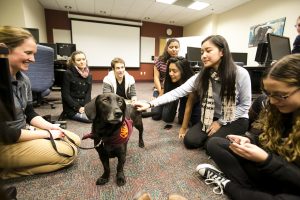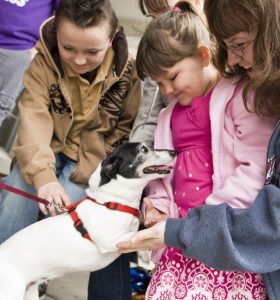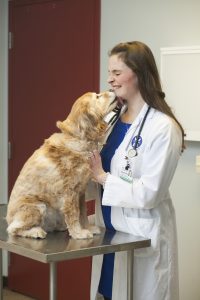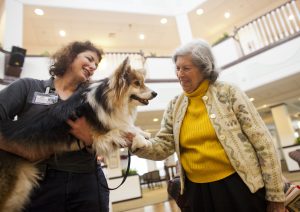Research
Human-Animal Interaction and Social Anxiety in Adolescence
 Social anxiety is one of the most critical mental health challenges facing youth, particularly during adolescence. Dr. Mueller’s lab Pets and Well-Being Lab conducts research on the role of pet ownership and animal-assisted intervention in mitigating the effects of social anxiety and in supporting resilience during adolescence. Her research in this area has been funded by the Eunice Kennedy Shriver National Institute of Child Health and Human Development (NIH/NICHD), the Society for Companion Animal Studies, and the Brain and Behavior Research Foundation.
Social anxiety is one of the most critical mental health challenges facing youth, particularly during adolescence. Dr. Mueller’s lab Pets and Well-Being Lab conducts research on the role of pet ownership and animal-assisted intervention in mitigating the effects of social anxiety and in supporting resilience during adolescence. Her research in this area has been funded by the Eunice Kennedy Shriver National Institute of Child Health and Human Development (NIH/NICHD), the Society for Companion Animal Studies, and the Brain and Behavior Research Foundation.
Dr. Mueller’s lab also has an ongoing collaboration with and Dr. Gary Bedell (TIHAI Advisory Board member and director of the Research on Child and Adult Activity Participation [ReCAAP] lab) developing and assessing a social participation intervention for youth with social anxiety.
Canines for Autism Activity and Nutrition (CANN)
 Over the last several decades, childhood obesity has become a national public health problem, and children diagnosed with Autism Spectrum Disorder (ASD) are particularly at risk for becoming overweight or obese. A multi-disciplinary research team across several Tufts campuses, along with a stakeholder panel, is investigating how a family’s dog could be integrated into their child’s current Applied Behavior Analysis (ABA) treatment plan. This research study, funded by the Tufts Clinical and Translational Science Institute, seeks to answer questions about the feasibility of a pilot program that will be integrated into a child’s treatment plan.
Over the last several decades, childhood obesity has become a national public health problem, and children diagnosed with Autism Spectrum Disorder (ASD) are particularly at risk for becoming overweight or obese. A multi-disciplinary research team across several Tufts campuses, along with a stakeholder panel, is investigating how a family’s dog could be integrated into their child’s current Applied Behavior Analysis (ABA) treatment plan. This research study, funded by the Tufts Clinical and Translational Science Institute, seeks to answer questions about the feasibility of a pilot program that will be integrated into a child’s treatment plan.
Reducing obesity risk in this vulnerable and growing population of individuals with autism is needed to prevent the development of chronic disease in adulthood. This collaborative team, which spans a multitude of specialties, is at the front-lines of the battle against childhood obesity.
Human-Animal Interaction and Positive Youth Development
 Human-animal interaction can provide the opportunity for responsibility, the development of social skills and empathy, and positive community relationships. Understanding how HAI may be part of a broader developmental context that promotes positive outcomes for diverse children and adolescence is a key area of scholarship for TIHAI.
Human-animal interaction can provide the opportunity for responsibility, the development of social skills and empathy, and positive community relationships. Understanding how HAI may be part of a broader developmental context that promotes positive outcomes for diverse children and adolescence is a key area of scholarship for TIHAI.
Current research includes:
- Assessing HAI and trajectories of adolescent development in diverse youth (funded by the Human-Animal Bond Research Institute)
- HAI, parental behavior, and adolescent development through a collaboration with the Youth, Media, and Well-Being lab at the Wellesley Centers for Women, funded by the Eunice Kennedy Shriver National Institute of Child Health and Human Development (NIH/NICHD).
- Animal, horticulture, and nature-based interventions as an approach to supporting youth self-regulatory skills in special education environments (through a collaboration with the Institute for Human-Animal Connection at the University of Denver). For more information and to download the study’s comprehensive documentation report, go to Green Chimney’s Recent Studies/Findings page here.
HAI and Veterinary Medicine
 TIHAI researchers focus on HAI in the context of veterinary medicine in a number of different topic areas, including:
TIHAI researchers focus on HAI in the context of veterinary medicine in a number of different topic areas, including:
- Human-horse interactions and decision-making about veterinary care
- Stress in therapy animals
- Caregiver burden
- Quality of life
- HAI and pet obesity
- Access to affordable veterinary care for underserved populations
- Service learning and civic engagement in veterinary medicine
See our Publications page for more information about our research on this topic.
Safety and Policies in Animal-Assisted Interventions
 One of TIHAI’s core areas of scholarship is the assessment and development of policies that promote safety and effectiveness in animal-assisted interventions.
One of TIHAI’s core areas of scholarship is the assessment and development of policies that promote safety and effectiveness in animal-assisted interventions.
Download our ‘how-to guide’ for facilities wishing to develop therapy animal programs here.